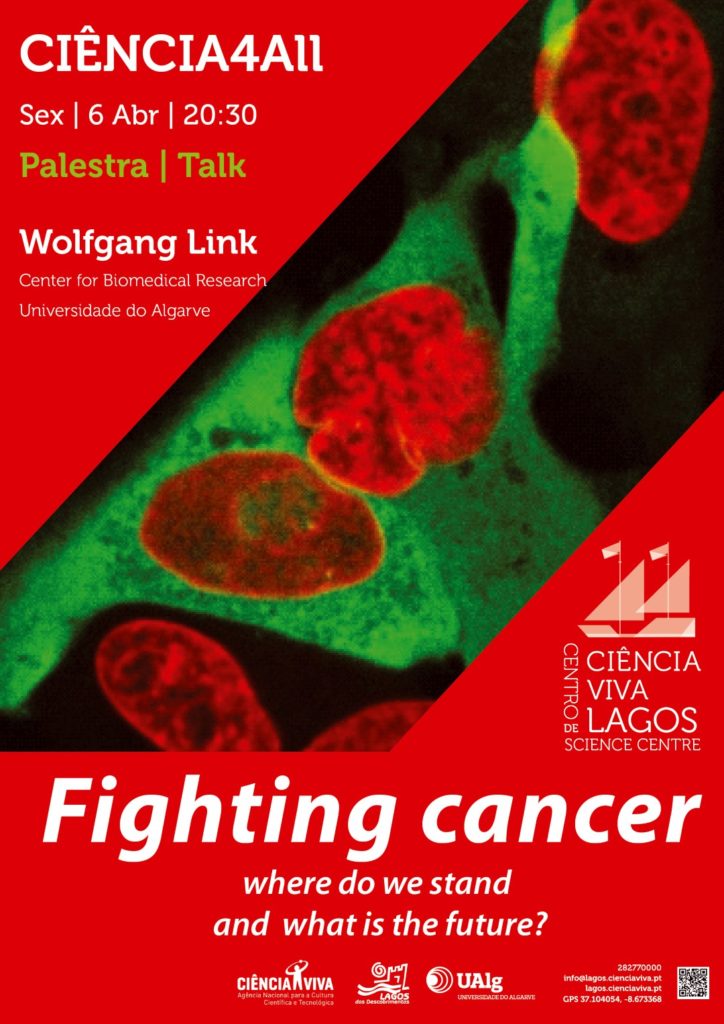 The Centro Ciência Viva de Lagos (CCVL) invited Wolfgang Link to talk about the fight that Science is doing against cancer, revealing a little of its own research, on the 6th of April, at 20:30.
The Centro Ciência Viva de Lagos (CCVL) invited Wolfgang Link to talk about the fight that Science is doing against cancer, revealing a little of its own research, on the 6th of April, at 20:30.
This lecture will be the first of the new Ciência4All programme, aimed mainly, but not exclusively, at the foreign community residing in the Algarve.
The Ciência4All program will be «a new space dedicated to the communication of Science for all and made in English».
Lectures and field trips will be the two means that CCVL will use to inform and involve the foreign community in the municipality of Lagos and adjacent municipalities.
This new offer by the Centro Ciência Viva de Lagos «arose from the need felt by this institution to also be relevant to a considerable part of the Algarve community – foreigners», explains the CCV.
The lectures will be given mainly by foreign researchers from the University of Algarve, every two months, on Fridays, at the end of the day.
Interspersed with the lectures, the Center presents a program of field trips, guided by CCVL elements, in a bilingual format, with a fixed cost per participant, on Saturday mornings.
In this first lecture in 2018, Wolfgang Link, a researcher at the Center for Biomedical Research at the University of Algarve, will focus on the topic Fighting Cancer – where do we stand and what is the future.
Lecture Summary
Based on technological progress within life sciences which allowed for the knowledge and understanding of the molecular bases of cancer, our way to find new medicines has changed dramatically during the last few decade.
We are now witnessing that our accumulated knowledge on cancer as a result of research carried out during the last 40 years is being translated into better treatments.
However, cancer is a very complex disease, it actually consists of over 100 different diseases and therapeutic success does not improve all cancer types at the same pace.
The huge progress made comes at a cost, though. The new cancer medicines are very expensive and we are running the risk of limiting the access to these therapies to the wealthy.
Based on technological progress in the life sciences, which allowed knowledge and understanding of the molecular basis of cancer, the way to find new drugs has changed dramatically in the last decade.
We are faced with the fact that the knowledge accumulated over the last 40 years from cancer research has resulted in the development of better treatments.
However, cancer is a very complex disease, in fact it consists of more than 100 different diseases and therapeutic success is not equal for different types of cancer. The enormous progress made comes, however, at a cost, new cancer drugs are very expensive and we run the risk of limiting access to these therapies to the rich.
Wolfgang Link Biography
Wolfgang Link currently holds the position as an Assistant Professor at the Department of Biomedical Sciences and Medicine (DCBM, University of Algarve). He is Head of the Department of Oncobiology and Coordinator of Translational Research at the Center for Biomedical Research (CBMR, University of Algarve, Faro, Portugal).
Dr Link completed his PhD degree in Molecular Neuroscience (the experimental part was conducted at the Cajal Institute in Madrid, 1995 – 1999) from the University of Hamburg (Germany). He continued his scientific career at the Centro Nacional de Biotechnología (CNB) in Madrid; the biotech company Elegene GmbH and the National Cancer Research Center (CNIO).
Dr Link counts with more than 20 years of experience in basic and translational biomedical research reflected in over 60 publications, three patents, many invited key notes and plenary presentations at international conferences. Research in the Link lab is focused on cancer signaling as well as target and drug discovery.
Wolfgang Link currently holds an assistant professorship in the Department of Biomedical Sciences and Medicine (DCBM, University of Algarve). He is head of the Department of Oncobiology and coordinator of Translational Research at the Center for Biomedical Research (CBMR, University of Algarve).
Wolfgang Link holds a Ph.D. in Molecular Neuroscience (the experimental part was carried out at the Instituto Cajal in Madrid, 1995 – 1999) from the University of Hamburg (Germany). During his scientific career, he was at the National Biotechnology Center (CNB) in Madrid; at the biotechnology company Elegene GmbH and at the National Center for Oncology Research (CNIO).
Wolfgang Link has over 20 years of experience in biomedical research, reflected in over 60 publications, three patents, many lectures and plenary presentations at international conferences. Research in Link's lab is focused on cancer signaling as well as target and drug discovery.


















Comments